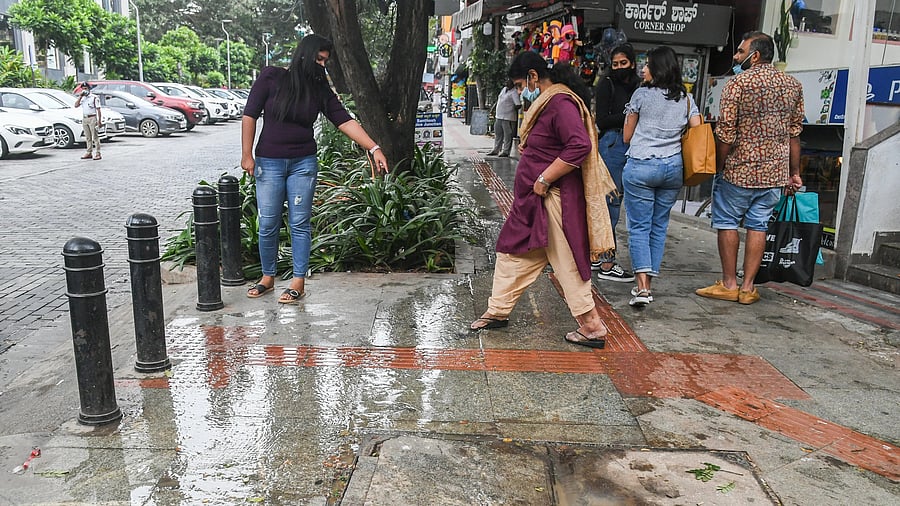
With BWSSB denying water and sewage connections to houses without an occupancy certificate, owners let out out sewage to the roads, turning them into sewage pools.
Credit: DH file photo
Bengaluru: The Supreme Court’s directive to not provide power and water connections to illegal buildings without an Occupancy Certificate (OC) has left many house owners in the lurch.
While the rule may be intended at regulating constructions and bringing down illegal constructions, unintended consequences seem to be many.
With the Bangalore Water Supply and Sewerage Board (BWSSB) denying water and sewage connections to these houses, many roads, especially on the city’s periphery where a large number of illegal buildings have popped up owing to the growing population close to IT hubs, many roads have turned sewage pools.
“Be it Prithvi Layout, Prashanth Layout and even ECC Road, these were good residential layouts with a friendly environment. Now, with a large number of illegal buildings which have been denied BWSSB connections, many of them let the sewage on to the roads. As a result, roads have become sewage pools,” said Sandeep Anirudhan, a citizen activist.
Many house owners who have been denied connections by BWSSB now let out sewage on to roads, which eventually flow over to neighborhood houses and lakes, polluting the water bodies and raising an alarm on spread of diseases.
That apart, many draw out illegal power and water connections, leading to huge revenue losses to the government and increasing the stress on the infrastructure.
“We have been getting complaints of illegal connections and are acting upon it. However, it is difficult to keep tracking such cases on a regular basis,” a senior BWSSB official said.
He said many of them tend to connect sewage to the existing network without the required permissions.
Drawing illegal power connections could both endanger the lives of people and lead to significant revenue loss to Bescom, electrical contractors said.
“Many of them just draw lines during the night and remove it by morning. They have UPS systems which will be charged during the night and used in the morning hours. This goes unaccounted and Bescom could be losing crores of rupees. If at all Bescom had given them a connection, even if we consider basic usage, Bescom would have earned at least Rs 30 crore - Rs 40 crore in revenue every month, apart from upfront payment to get power connection,” said C Ramesh, president, Karnataka State Licensed Electrical Contractors Association.
While Bescom officials maintained that their vigilance team was keeping a close watch on such power theft incidents, senior officials did not deny that many such cases were being reported.
“We are definitely losing a lot of revenue,” a senior Bescom official acknowledged.
Way ahead
The urban development department (UDD) recently proposed amendments to the Greater Bengaluru Governance Act, 2024, the Karnataka Municipal Corporations Act, 1976, and model building by-laws of the rural development and panchayat raj department to remove occupancy certificate mandate for buildings on plots less than 1,200 sq ft. While this could provide some relief to smaller illegal buildings in city, it could also lead to lawlessness, citizens said.
“Recently, the special commissioner (Mahadevapura) conducted an inspection to check illegal buildings and close to 250 violations were observed on just a three-km stretch. In such a situation, the new rule will only encourage more lawlessness,” Anirudhan said.
Experts said this was not the way ahead and that there was a need to plan better.
Preventing the construction of illegal buildings should be the focus rather than solving the current problem with such measures.
“It is just a shortcut and will not help the city in any way. There is a need for proper planning,” said one expert.
Many home owners, who pre-booked their apartments with builders, are also struggling to get various utility connections since builders would have violated the law and constructed illegal floors.
“The builders would have made money by constructing additional floors and now, buyers have to struggle,” said Dhananjaya Padmanabhachar from the Karnataka Home Buyers Forum, a collective of apartment owners’ associations.
While UDD has come up with a work-around for smaller plots, bigger ones and apartment complexes still pose a problem. Hence, there is a need for better regulations and monitoring of large real estate projects.